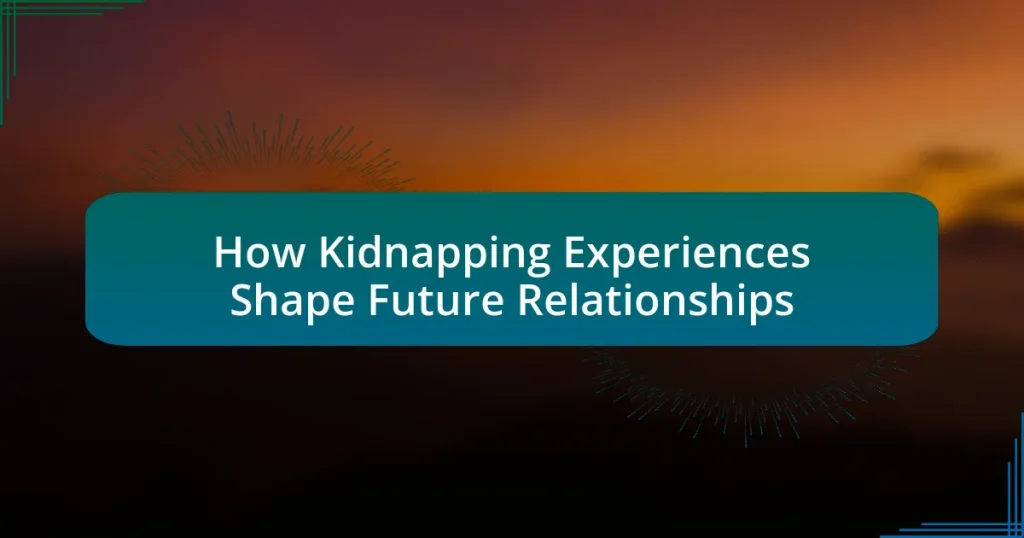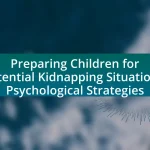The article examines how kidnapping experiences significantly influence future relationships, focusing on the psychological effects, attachment styles, and coping mechanisms of survivors. It highlights the prevalence of trust issues, emotional trauma, and PTSD among individuals who have been kidnapped, which complicates their ability to form healthy connections. The discussion includes the role of communication, boundary-setting, and therapy in rebuilding trust and fostering emotional recovery, as well as the impact of societal perceptions and family dynamics on the survivor’s reintegration into social settings. Overall, the article provides a comprehensive overview of the long-term implications of kidnapping experiences on interpersonal relationships.
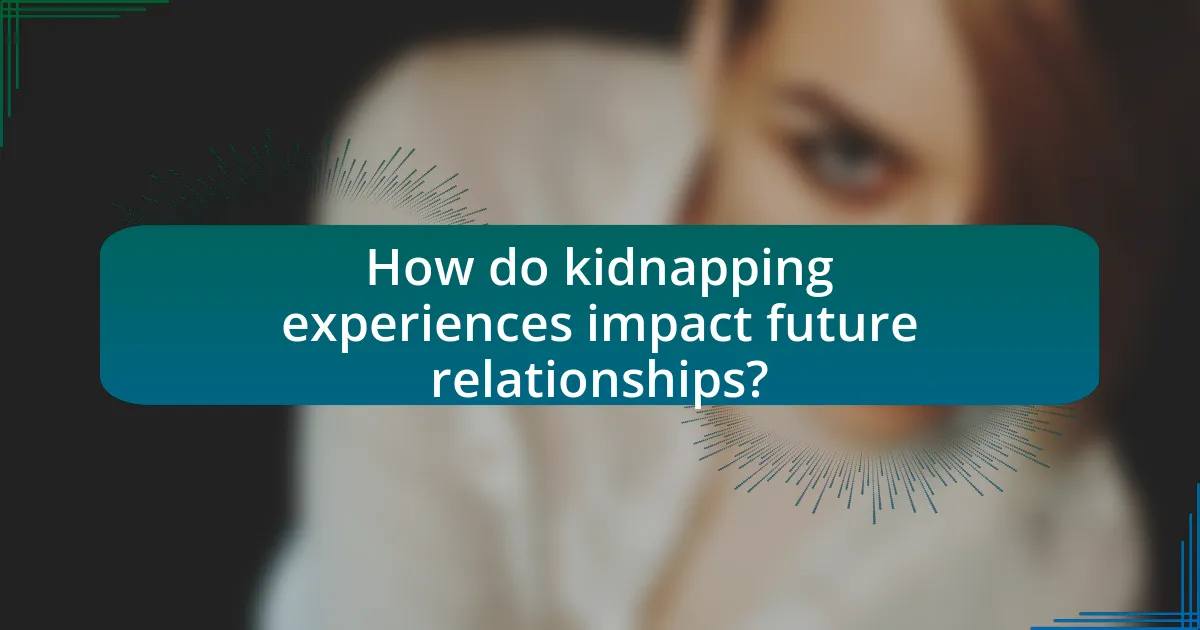
How do kidnapping experiences impact future relationships?
Kidnapping experiences significantly impact future relationships by instilling trust issues and emotional trauma in survivors. Individuals who have been kidnapped often struggle with anxiety, fear, and attachment difficulties, which can hinder their ability to form healthy connections. Research indicates that trauma from such experiences can lead to post-traumatic stress disorder (PTSD), affecting interpersonal dynamics and emotional availability in future relationships. A study published in the Journal of Traumatic Stress found that survivors of violent crimes, including kidnapping, frequently exhibit heightened levels of distrust and emotional dysregulation, which complicates their ability to engage in stable, supportive relationships.
What psychological effects do kidnapping experiences have on individuals?
Kidnapping experiences can lead to significant psychological effects on individuals, including post-traumatic stress disorder (PTSD), anxiety, depression, and difficulties in forming trusting relationships. Research indicates that survivors often experience intrusive memories, hyperarousal, and emotional numbing, which are hallmark symptoms of PTSD. A study published in the Journal of Traumatic Stress found that approximately 30% of kidnapping survivors develop PTSD, highlighting the prevalence of this condition among affected individuals. Additionally, the trauma can result in long-term relational issues, as survivors may struggle with trust and intimacy, impacting their ability to form healthy relationships in the future.
How do trauma responses manifest in personal relationships?
Trauma responses manifest in personal relationships through behaviors such as avoidance, hyper-vigilance, and emotional dysregulation. Individuals who have experienced trauma, such as kidnapping, may struggle to trust others, leading to withdrawal or difficulty forming close connections. Research indicates that trauma can trigger a heightened state of alertness, causing individuals to perceive threats in benign situations, which can result in conflict or misunderstandings in relationships. Additionally, emotional dysregulation may lead to intense reactions to perceived slights, further complicating interpersonal dynamics. These manifestations are supported by studies showing that trauma can alter attachment styles, often resulting in anxious or avoidant behaviors in relationships.
What role does trust play in relationships after a kidnapping experience?
Trust is crucial in relationships after a kidnapping experience, as it directly influences emotional recovery and relational dynamics. Survivors often struggle with feelings of betrayal and vulnerability, which can hinder their ability to trust others. Research indicates that rebuilding trust is essential for establishing healthy connections, as trust fosters safety and intimacy, both of which are vital for emotional healing. A study published in the Journal of Traumatic Stress highlights that individuals who successfully rebuild trust report better psychological outcomes and stronger relationships post-trauma. Thus, trust serves as a foundational element that can either facilitate or obstruct the healing process in relationships following a kidnapping.
How do kidnapping experiences influence attachment styles?
Kidnapping experiences significantly influence attachment styles by fostering insecurity and anxiety in relationships. Victims often develop anxious attachment styles characterized by fear of abandonment and hyper-vigilance in interpersonal connections. Research indicates that traumatic events, such as kidnapping, can lead to alterations in the brain’s stress response systems, which in turn affect emotional regulation and relational dynamics. For instance, a study published in the Journal of Traumatic Stress by researchers like Briere and Scott (2015) highlights that individuals with a history of trauma, including kidnapping, are more likely to exhibit maladaptive attachment behaviors, such as avoidance or anxiety in relationships. This evidence underscores the profound impact that such traumatic experiences have on an individual’s ability to form secure attachments in future relationships.
What are the different attachment styles that may develop?
The different attachment styles that may develop are secure, anxious, avoidant, and disorganized. Secure attachment is characterized by comfort with intimacy and a balanced approach to relationships. Anxious attachment involves a preoccupation with relationships and fear of abandonment, often leading to clinginess. Avoidant attachment is marked by a reluctance to depend on others and a tendency to maintain emotional distance. Disorganized attachment combines elements of both anxious and avoidant styles, often resulting from trauma or inconsistent caregiving. Research indicates that early experiences, such as those related to kidnapping, can significantly influence the development of these attachment styles, impacting future relationships and emotional well-being.
How can these attachment styles affect future romantic relationships?
Attachment styles significantly influence future romantic relationships by shaping individuals’ emotional responses and behaviors towards partners. For instance, individuals with secure attachment styles tend to exhibit healthier relationship dynamics, characterized by effective communication and trust. Conversely, those with anxious attachment styles may experience heightened jealousy and fear of abandonment, leading to relationship instability. Research indicates that avoidant attachment styles often result in emotional distance and difficulty in forming intimate connections, which can hinder relationship satisfaction. A study published in the Journal of Social and Personal Relationships found that attachment styles are predictive of relationship outcomes, with secure individuals reporting higher levels of relationship satisfaction compared to their insecure counterparts.
What coping mechanisms do survivors of kidnapping develop?
Survivors of kidnapping often develop coping mechanisms such as avoidance, hyper-vigilance, and emotional numbing. These mechanisms serve to help individuals manage the trauma and anxiety associated with their experiences. For instance, avoidance may manifest as steering clear of situations that remind them of the kidnapping, while hyper-vigilance involves heightened awareness of their surroundings to prevent future threats. Emotional numbing can occur as a way to detach from painful feelings, which is a common response to trauma. Research indicates that these coping strategies can significantly impact future relationships, as they may lead to trust issues and difficulties in emotional intimacy.
How do these coping mechanisms affect interpersonal dynamics?
Coping mechanisms significantly influence interpersonal dynamics by shaping how individuals interact with others following traumatic experiences, such as kidnapping. For instance, individuals who adopt avoidance strategies may struggle to form close relationships due to fear of vulnerability, leading to emotional distance. Conversely, those who utilize adaptive coping strategies, such as seeking social support, often foster stronger connections and enhance trust within their relationships. Research indicates that effective coping can mitigate the negative impacts of trauma on social interactions, promoting resilience and healthier relational patterns.
What are the long-term implications of these coping strategies?
The long-term implications of coping strategies developed from kidnapping experiences include altered trust levels, heightened anxiety, and difficulties in forming intimate relationships. Individuals may develop a pervasive sense of mistrust towards others, impacting their ability to engage in healthy relationships. Research indicates that trauma can lead to increased anxiety and hyper-vigilance, which may persist long after the traumatic event, affecting social interactions and emotional connections. Furthermore, coping strategies such as avoidance or emotional numbing can hinder emotional expression, making it challenging to establish deep, meaningful relationships in the future.
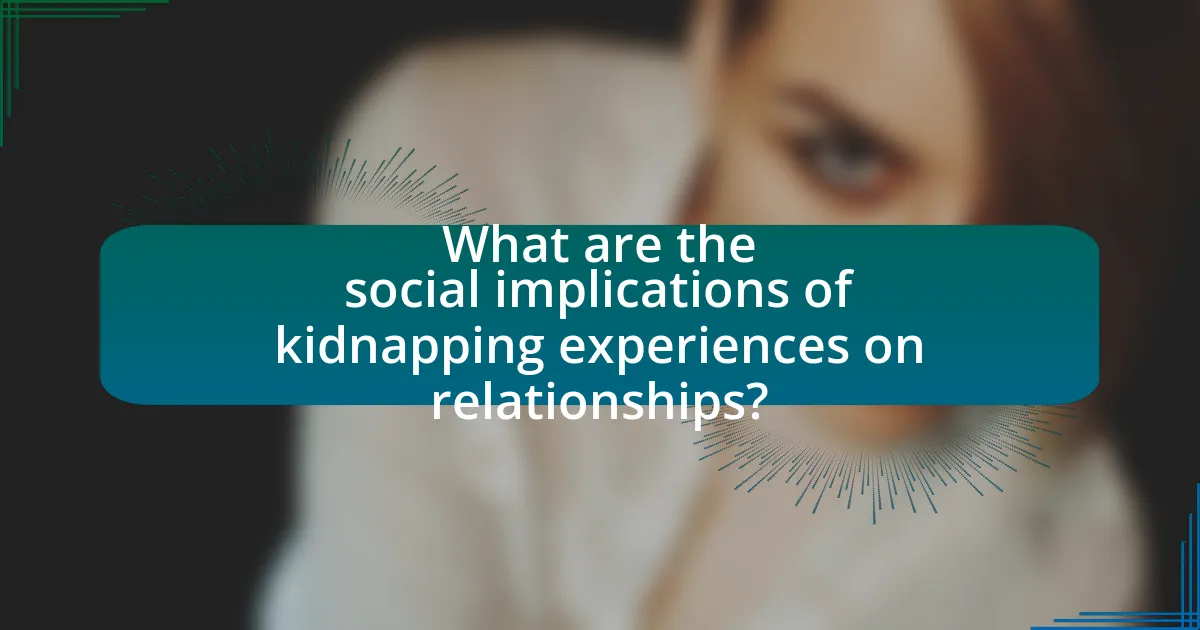
What are the social implications of kidnapping experiences on relationships?
Kidnapping experiences significantly impact relationships by fostering mistrust and emotional distress among survivors and their loved ones. Survivors often struggle with anxiety and PTSD, which can lead to withdrawal from social interactions and difficulty in forming new relationships. Studies indicate that approximately 30% of kidnapping survivors develop long-term psychological issues, affecting their ability to maintain healthy connections. Additionally, the trauma can strain existing relationships, as family and friends may feel helpless or unsure of how to support the survivor, leading to increased isolation. This dynamic can create a cycle of emotional distance, further complicating the survivor’s reintegration into social settings.
How do societal perceptions of kidnapping affect survivors?
Societal perceptions of kidnapping significantly affect survivors by influencing their mental health, social interactions, and reintegration into society. Survivors often face stigma and misunderstanding, which can lead to feelings of isolation and shame. Research indicates that negative societal attitudes can exacerbate trauma symptoms, making recovery more challenging. For instance, a study published in the Journal of Traumatic Stress found that survivors who perceived societal blame experienced higher levels of post-traumatic stress disorder (PTSD) symptoms. Additionally, societal perceptions can impact the support survivors receive from their communities, affecting their ability to rebuild relationships and trust.
What stigma do survivors face in their social circles?
Survivors of kidnapping often face stigma in their social circles, including feelings of isolation, misunderstanding, and judgment. This stigma arises from societal misconceptions about trauma, leading others to view survivors as damaged or overly sensitive. Research indicates that survivors may encounter negative stereotypes, such as being perceived as weak or unable to cope, which can hinder their ability to form trusting relationships. Additionally, the lack of awareness about the psychological impact of kidnapping can result in friends and family unintentionally minimizing their experiences, further exacerbating feelings of alienation.
How can societal support systems aid in recovery?
Societal support systems can significantly aid in recovery by providing emotional, psychological, and practical assistance to individuals who have experienced trauma, such as kidnapping. These systems, which include family, friends, community organizations, and mental health services, create a network of resources that foster resilience and healing. Research indicates that social support can reduce symptoms of post-traumatic stress disorder (PTSD) and promote overall mental well-being. For instance, a study published in the Journal of Traumatic Stress found that individuals with strong social support networks reported lower levels of distress and faster recovery times after traumatic events. This demonstrates that societal support systems play a crucial role in facilitating recovery by offering a sense of belonging, understanding, and access to necessary resources.
What role do family dynamics play in the aftermath of a kidnapping?
Family dynamics significantly influence the emotional and psychological recovery of individuals affected by kidnapping. The relationships within a family can either provide essential support or exacerbate trauma, impacting the victim’s reintegration into the family unit. For instance, studies indicate that strong familial bonds can facilitate healing by offering emotional stability and a sense of security, while dysfunctional family interactions may lead to increased feelings of isolation and anxiety in the victim. Research published in the Journal of Family Psychology highlights that supportive family environments contribute to better mental health outcomes for kidnapping survivors, demonstrating the critical role of family dynamics in the aftermath of such traumatic experiences.
How can family relationships be strengthened post-trauma?
Family relationships can be strengthened post-trauma by fostering open communication, providing emotional support, and engaging in shared activities. Open communication allows family members to express their feelings and experiences, which is crucial for healing. Emotional support, such as validating each other’s feelings and offering reassurance, helps build trust and connection. Engaging in shared activities, like family therapy or recreational outings, promotes bonding and creates positive experiences that can counterbalance the trauma. Research indicates that families who actively work together to process trauma tend to have stronger relationships, as they develop resilience and a deeper understanding of one another.
What challenges do families face in supporting a survivor?
Families face significant emotional and logistical challenges in supporting a survivor of kidnapping. Emotional challenges include dealing with trauma responses such as anxiety, depression, and post-traumatic stress disorder (PTSD) that the survivor may exhibit, which can strain family dynamics. Logistically, families often struggle with navigating medical and psychological care, as well as managing the survivor’s reintegration into daily life, which may involve changes in routines and relationships. Research indicates that 30% of kidnapping survivors experience long-term psychological effects, impacting their interactions with family members and complicating the support process.
How do friendships change for kidnapping survivors?
Friendships for kidnapping survivors often become strained or altered due to the trauma experienced during the event. Survivors may struggle with trust issues, leading to difficulties in forming new relationships or maintaining existing ones. Research indicates that trauma can significantly impact social connections, as survivors may feel isolated or misunderstood by friends who have not shared similar experiences. Additionally, the emotional and psychological aftermath of kidnapping can result in survivors prioritizing relationships that offer safety and support, while distancing themselves from those that feel threatening or untrustworthy.
What are common reactions from friends towards a survivor?
Common reactions from friends towards a survivor include support, confusion, and sometimes withdrawal. Friends often express support through emotional and practical assistance, helping the survivor navigate their recovery. However, confusion can arise as friends may struggle to understand the survivor’s experiences and feelings, leading to awkward interactions. In some cases, friends might withdraw due to discomfort or fear of saying the wrong thing, which can further isolate the survivor. Research indicates that social support is crucial for recovery, highlighting the importance of friends’ reactions in shaping the survivor’s future relationships.
How can friends best support a survivor of kidnapping?
Friends can best support a survivor of kidnapping by providing emotional support, listening without judgment, and respecting the survivor’s pace in discussing their experience. Emotional support is crucial as survivors often face trauma, anxiety, and trust issues; having a reliable friend can help mitigate feelings of isolation. Listening without judgment allows the survivor to express their feelings openly, fostering a safe environment for healing. Respecting the survivor’s pace is essential, as pushing them to share or engage before they are ready can exacerbate their trauma. Research indicates that social support significantly aids recovery from traumatic experiences, highlighting the importance of a supportive network in the healing process.
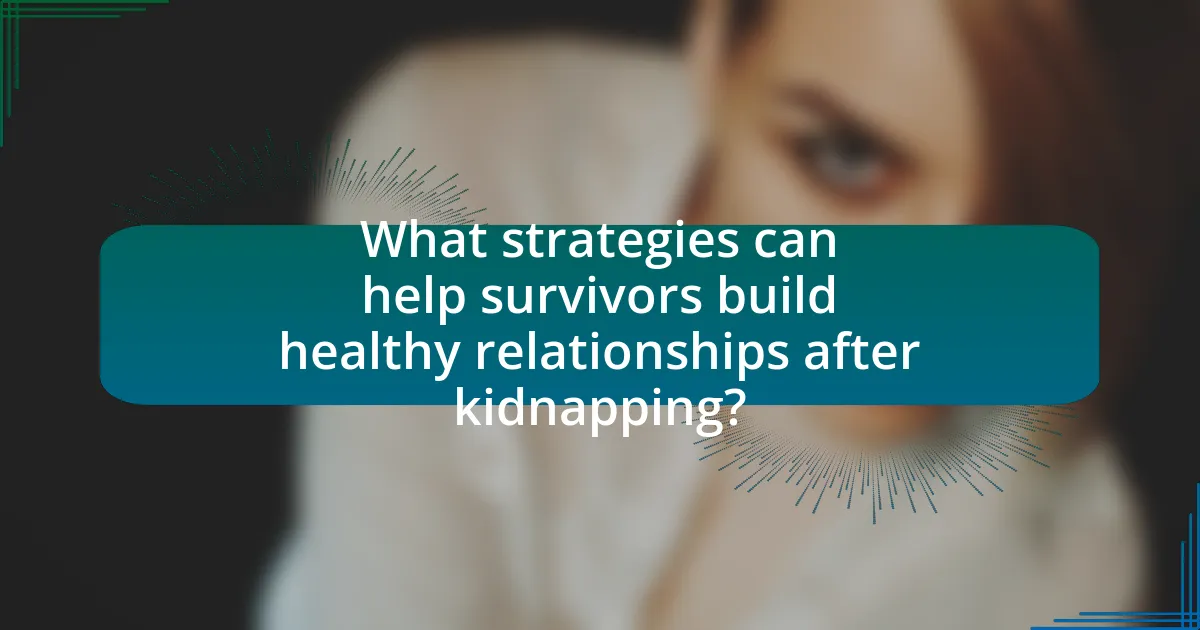
What strategies can help survivors build healthy relationships after kidnapping?
Survivors can build healthy relationships after kidnapping by engaging in trauma-informed therapy, establishing clear communication, and setting healthy boundaries. Trauma-informed therapy helps survivors process their experiences and develop coping strategies, which is essential for emotional healing. Establishing clear communication fosters trust and understanding, allowing survivors to express their needs and feelings openly. Setting healthy boundaries is crucial for creating safe spaces in relationships, enabling survivors to feel secure and respected. Research indicates that these strategies can significantly improve relationship satisfaction and emotional well-being for trauma survivors.
How can therapy assist in rebuilding trust in relationships?
Therapy can assist in rebuilding trust in relationships by providing a structured environment for open communication and emotional healing. In therapy, individuals can explore their feelings of betrayal or fear stemming from past experiences, including trauma such as kidnapping, which often leads to trust issues. Through techniques like cognitive-behavioral therapy, clients learn to identify and challenge negative thought patterns that hinder trust. Research indicates that therapy can significantly improve relationship satisfaction and trust levels; for instance, a study published in the Journal of Marital and Family Therapy found that couples who engaged in therapy reported a 70% increase in trust and communication skills. This evidence supports the effectiveness of therapy in fostering a safe space for vulnerability, ultimately aiding in the restoration of trust.
What types of therapy are most effective for survivors?
Cognitive Behavioral Therapy (CBT) and Eye Movement Desensitization and Reprocessing (EMDR) are the most effective types of therapy for survivors of traumatic experiences such as kidnapping. CBT helps survivors reframe negative thoughts and develop coping strategies, while EMDR specifically targets trauma by processing distressing memories through guided eye movements. Research indicates that CBT can significantly reduce symptoms of PTSD, with studies showing that approximately 60-80% of participants experience a reduction in symptoms after treatment. EMDR has also been validated in numerous studies, demonstrating its efficacy in reducing trauma-related symptoms in survivors.
How can therapy address specific relationship challenges?
Therapy can address specific relationship challenges by providing a structured environment for individuals to explore their feelings, improve communication skills, and develop coping strategies. In the context of individuals affected by kidnapping experiences, therapy can help them process trauma, which often manifests in trust issues and attachment difficulties in future relationships. Research indicates that trauma-informed therapy approaches, such as Eye Movement Desensitization and Reprocessing (EMDR) and Cognitive Behavioral Therapy (CBT), can significantly reduce symptoms of anxiety and improve relational dynamics. For instance, a study published in the Journal of Traumatic Stress found that trauma-focused therapies led to improved relationship satisfaction among survivors of traumatic events. This evidence supports the effectiveness of therapy in addressing the unique challenges faced by individuals with such experiences.
What role does communication play in healing relationships?
Communication is essential in healing relationships as it fosters understanding and trust between individuals. Effective communication allows parties to express their feelings, clarify misunderstandings, and address grievances, which is crucial for rebuilding emotional connections. Research indicates that open dialogue can significantly reduce anxiety and promote emotional healing, particularly in relationships affected by trauma, such as those stemming from kidnapping experiences. For instance, a study published in the Journal of Family Psychology found that couples who engaged in constructive communication reported higher levels of relationship satisfaction and resilience after traumatic events. This evidence underscores the vital role communication plays in facilitating recovery and strengthening bonds in the aftermath of distressing experiences.
How can survivors express their needs to partners effectively?
Survivors can express their needs to partners effectively by using clear and direct communication. This involves articulating specific feelings and requirements without ambiguity, which fosters understanding and support. Research indicates that open dialogue about emotional and physical needs can significantly enhance relationship satisfaction and trust, particularly for individuals with trauma backgrounds. For instance, a study published in the Journal of Traumatic Stress highlights that survivors who engage in honest conversations about their experiences and needs report better relational outcomes.
What communication strategies can foster understanding and support?
Effective communication strategies that can foster understanding and support include active listening, empathy, and clear expression of thoughts and feelings. Active listening involves fully concentrating on the speaker, which helps in accurately understanding their perspective and emotions. Empathy allows individuals to connect on an emotional level, validating the experiences of others, particularly in sensitive contexts like kidnapping experiences. Clear expression of thoughts and feelings ensures that messages are conveyed without ambiguity, reducing misunderstandings. Research indicates that these strategies enhance relational dynamics, particularly in trauma-affected individuals, by promoting trust and emotional safety.
What practical tips can help survivors navigate future relationships?
Survivors can navigate future relationships by establishing clear boundaries and practicing open communication. Setting boundaries helps survivors protect their emotional well-being and fosters a sense of safety in relationships. Open communication allows survivors to express their needs and concerns, which is crucial for building trust. Research indicates that effective communication and boundary-setting are essential for healthy relationships, particularly for individuals with trauma backgrounds, as they help mitigate anxiety and promote emotional security.
How can setting boundaries improve relationship dynamics?
Setting boundaries can significantly improve relationship dynamics by fostering mutual respect and clear communication. When individuals establish boundaries, they define acceptable behaviors and limits, which helps prevent misunderstandings and conflicts. Research indicates that clear boundaries contribute to healthier interactions, as they allow individuals to express their needs and expectations openly. For instance, a study published in the Journal of Family Psychology found that couples who communicated their boundaries effectively reported higher relationship satisfaction and lower levels of conflict. This evidence supports the notion that setting boundaries not only enhances personal well-being but also strengthens the overall quality of relationships.
What self-care practices can enhance relationship health?
Self-care practices that can enhance relationship health include effective communication, setting boundaries, and engaging in individual therapy. Effective communication fosters understanding and connection, which are essential for healthy relationships. Research indicates that couples who communicate openly report higher satisfaction levels (Gottman, 1994). Setting boundaries helps individuals maintain their identity and personal space, reducing feelings of resentment and promoting mutual respect. Engaging in individual therapy allows individuals to process past experiences, such as trauma from kidnapping, which can significantly impact future relationships. Studies show that therapy can improve emotional regulation and relationship skills (Norcross & Wampold, 2011).
